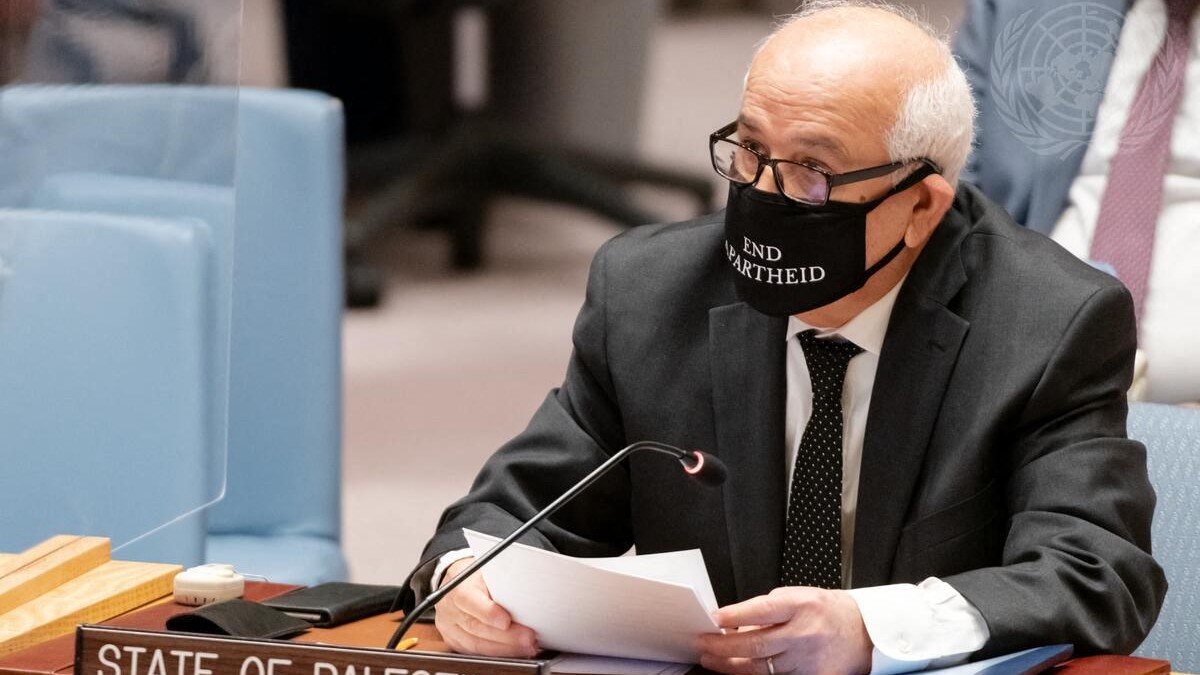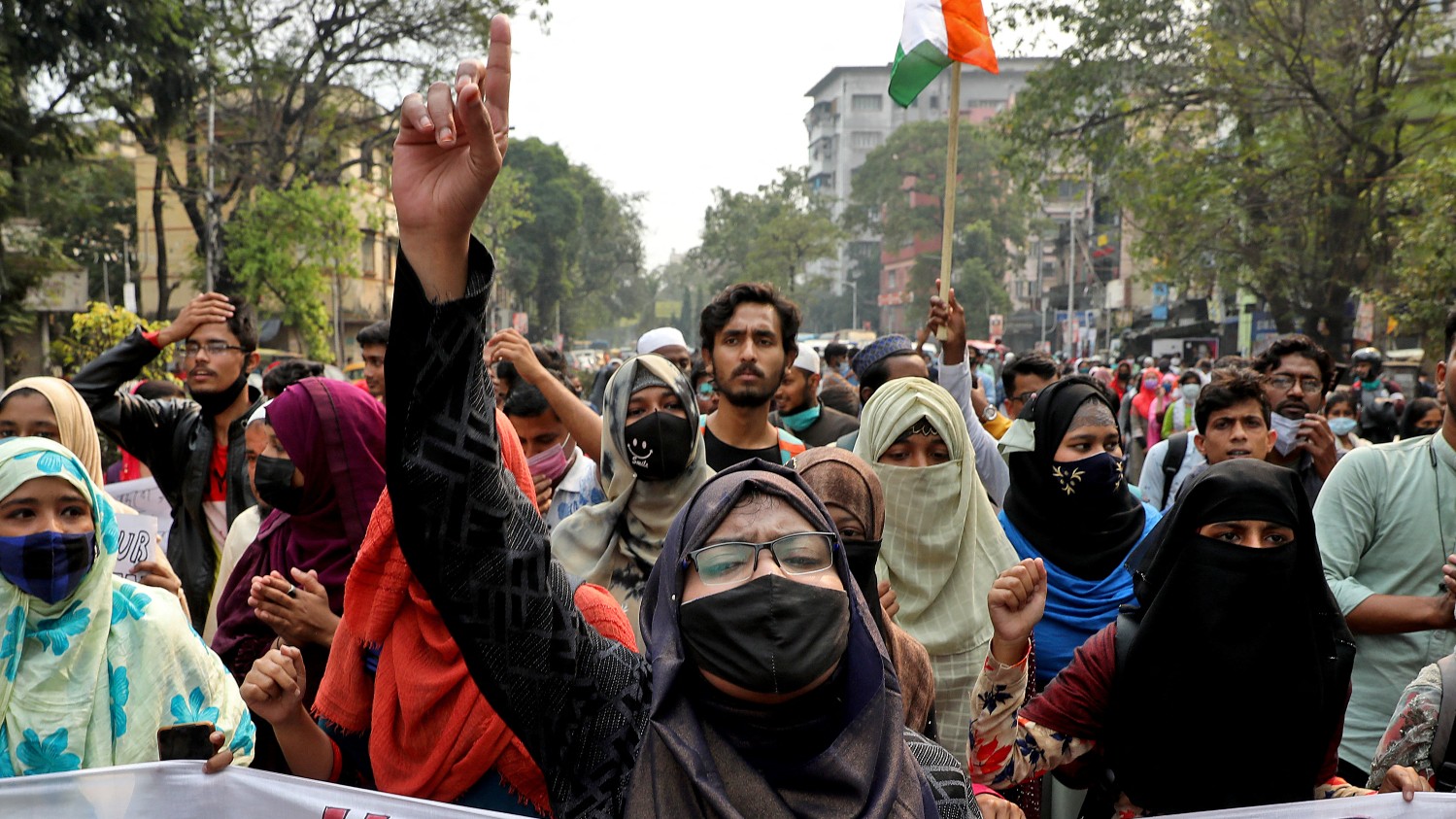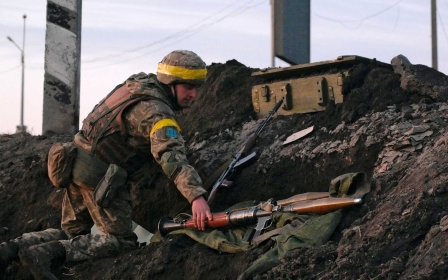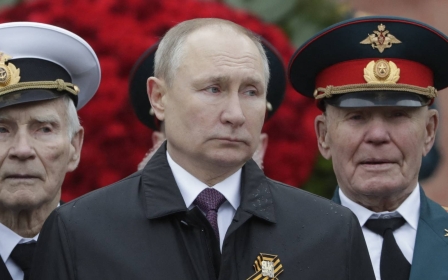Six Middle East stories you may have missed since the Russia-Ukraine war began
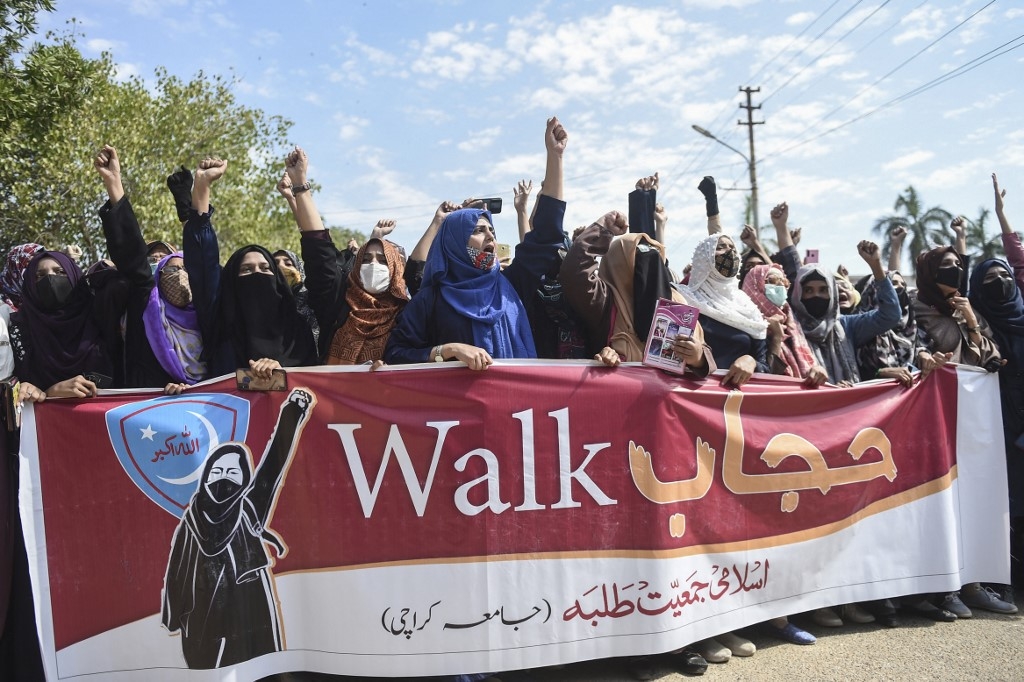
As the Russia-Ukraine conflict descended into a full-blown war this week, the Middle East carried on with its own conflicts, political machinations and protests.
Here are six stories you may have missed in the past week, when the world was fixated on Putin's invasion of Ukraine.
1- Palestine's UN envoy wears 'End apartheid' mask at Security Council meeting
New MEE newsletter: Jerusalem Dispatch
Sign up to get the latest insights and analysis on Israel-Palestine, alongside Turkey Unpacked and other MEE newsletters
Palestine's envoy to the United Nations wore a mask saying "End apartheid" at the monthly meeting of the Security Council on Wednesday, and urged the body to stop Israel from discriminating against Palestinians.
Riyad Mansour used the word "apartheid" at least 15 times during his address, where he called on the council to protect "our long-suffering people".
"This council may not be ready to use the word, but apartheid is - and has been for a while now - our reality," Mansour said at the UN headquarters in New York.
"Israel may be outraged by the word [but] everyone else should be outraged by the policy. Condemnations alone will never suffice to deter Israel. It is time to translate your words into actions. Actions to end apartheid."
He added that last month, Israeli Ambassador to the UN, Gilad Erdan, brought a stone into the Security Council chamber so members could visualise the violence that Israelis confront from Palestinians.
"I am so sorry, but the doors of this chamber could not fit Israeli F-16s, tanks, warships, military jeeps, drones, bombs and missiles," Mansour said.
2- Israeli air strikes kill six Syrian soldiers near Damascus
At least six pro-government fighters, including Syrian troops, were killed in Israeli air strikes on Thursday, which targeted positions held by Iran-backed groups near the capital Damascus, a war monitor reported.
It is the fourth time this month that Israeli strikes have been reported inside Syria, keeping up a campaign against pro-Iranian forces supporting the Damascus government in a civil war that has now raged for more than a decade.
"Israeli strikes killed six people, including two Syrian troops and four Iran-backed militia fighters whose nationalities remain unknown," the Syrian Observatory for Human Rights said.
The UK-based monitor, which has an extensive network of sources across the country, said the raids "targeted positions and arms depots" operated by Iran-backed groups near Damascus airport, destroying several weapons caches.
The strikes also targeted air defences south of Damascus, said the Observatory, which did not elaborate on any damage.
Syrian state media said the attack came at around 1:10am local time. The official Sana news agency said air defences intercepted most of the missiles, but three soldiers were killed.
The latest raids follow Israel's bombardment this week of a Syrian town near the armistice line on the Golan, strikes on a Syrian military post on 17 February, and on anti-aircraft batteries at the start of the month. The Observatory said Israel has carried out raids in Syria at least six times since the start of the year. Asked about the latest strikes, an Israeli army spokesman said: "We don't comment on reports in foreign media."
3- India's hijab ban: Targeting of Muslim women condemned across the Middle East
A ban on the hijab in schools in the southern Indian state of Karnataka, along with an escalation of religiously motivated attacks against Muslims in the country, has prompted widespread solidarity in protests around the Middle East and beyond.
From Dutch-Palestinian supermodel Bella Hadid to Nobel Peace Prize laureate Malala Yousafzai, public figures and social media users worldwide have spoken out against the discrimination against Muslim women over their choice of how to dress.
Videos circulating online have shown disturbing scenes in India of Muslim students being refused entry into school buildings and Muslim women being heckled outside education establishments. Young Hindu men and women have been seen brandishing saffron scarves to symbolise their opposition to the hijab.
On Wednesday, footage was widely shared of an Indian bank refusing to allow one of its veiled customers to withdraw money from her account.
India’s 200 million-strong Muslim minority community now fears that the hijab ban is infringing on its religious freedom.
The events in Karnataka have triggered a major row, one that has reverberated across the Arab world, sparking protests and social media activism against the ban.
In Kuwait, various protests have taken place over the past few weeks, with demonstrators standing outside the Indian embassy, carrying placards.
4- UN: North Africa-Europe migrant deaths at sea have increased by 155 percent
More than 1,160 migrants died at sea attempting to reach Europe from North Africa in the first half of 2021, up 155 percent year-on-year, the UN's migration agency said on Thursday.
The most deadly passage was across the central Mediterranean, where 769 deaths were recorded, the International Organization for Migration (IOM) said in a report drawing on data from its Missing Migrants Project.
The central Mediterranean route, running from Tunisia and Libya to Italy and Malta, has claimed more than 18,000 migrant lives since 2014, according to IOM.
The Western Africa-Atlantic crossing to Spain's Canary Islands was the second most deadly during the first half of last year, with 250 fatalities, it said.
The recorded migrant death toll across these two routes in the first half of 2020 was 450.
"Mobility restrictions" driven by policy responses to the Covid-19 pandemic "exacerbated the challenges facing migrant populations, forcing them to undertake perilous crossings", IOM noted in its report.
The surge in deaths came alongside evidence of both increased arrivals in at least one key destination and rising interceptions. More than 30,000 migrants were intercepted off North Africa in the first half of last year, up from 23,000 in the same period of 2020, amid increased maritime operations by both Libya and Tunisia, IOM said.
Arrivals in Italy rose 67 percent between the first and second quarters of 2021, culminating in monthly arrivals reaching almost 6,000 in both May and June, it said.
5- US prosecutors allege illegal campaign donations in 2016 election originated from UAE
US prosecutors preparing for a trial of two individuals on charges of illegally funnelling more than $5m to political committees, including one that backed Hillary Clinton's failed 2016 presidential campaign, have alleged that the money originated from the United Arab Emirates.
"The facts are this money came from the UAE government," Michelle Parikh, a Justice Department prosecutor, said at a hearing on Tuesday morning, as quoted by Politico.
In 2019, a grand jury indictment accused eight men of conspiring to illegally funnel money and make donations before and after the 2016 presidential election. Among those charged was George Nader, a UAE adviser, convicted paedophile and key witness in special counsel Robert Mueller’s investigation into Russian interference in the 2016 US presidential election.
The original indictment mentioned that the money had originated from a "Middle East country", but Tuesday's hearing was the first time that prosecutors publicly named the UAE as the source of the funds.
According to the indictment, the money was funnelled to Nader, who then gave it to the seven other men, mostly based in Los Angeles. They went on to make donations to Clinton and Democrat allies ahead of the presidential elections.
After Clinton lost to Donald Trump in the election, the men reportedly began donating to Democrats and Republicans alike, including a $1m donation to Trump's inaugural committee.
6- UN: Syria's humanitarian needs reach record high
The United Nations has said that a record number of people in Syria are in need of humanitarian assistance, more than a decade into a devastating civil war.
At least 14.6 million people in Syria are in need of humanitarian aid, up from 13.4 million last year, the UN's humanitarian agency OCHA said in a report published late on Wednesday.
"Suffering in Syria is at its highest level since the crisis began," said the UN deputy regional humanitarian coordinator for the Syria conflict, Mark Cutts. "The UN and its partners are reaching 7 million people every month, but more support is required," he said in a post on Twitter.
The war in Syria is estimated to have killed nearly half a million people and displaced millions more since it began with a brutal crackdown on anti-government protests in 2011. The country is also grappling with an economic crisis compounded by western sanctions, the Covid-19 pandemic and a sharp fall in the value of the Syrian pound.
Almost 76 percent of households are unable to meet their most basic needs, an increase of 10 percent from last year, OCHA said.
Syria’s internally displaced population makes up 37 percent of the people requiring humanitarian assistance, the report said. People who have never been displaced, or who returned to their place of origin before January 2021, are also increasingly unable to meet basic needs, OCHA said, calling it an "indication" of the growing scale of the crisis.
In 2021, 9.2 million vulnerable residents were estimated to be in need, according to OCHA.
"This represents a 44 percent increase... which likely highlights the significant impact economic deterioration has had on segments of the population historically less directly affected by hostilities and displacement."
Middle East Eye delivers independent and unrivalled coverage and analysis of the Middle East, North Africa and beyond. To learn more about republishing this content and the associated fees, please fill out this form. More about MEE can be found here.


